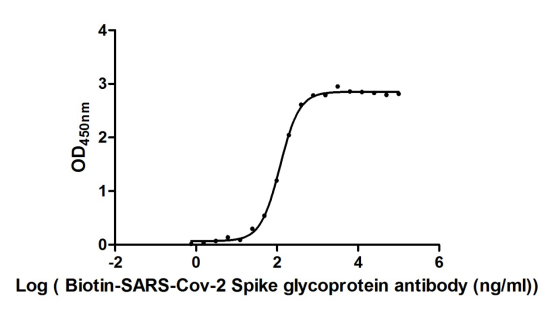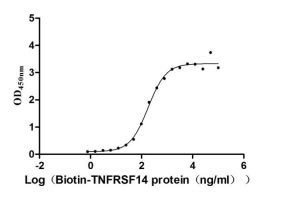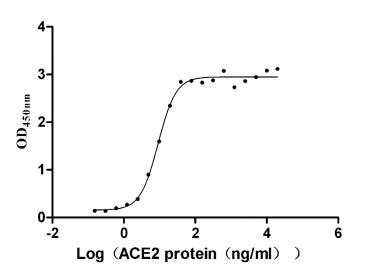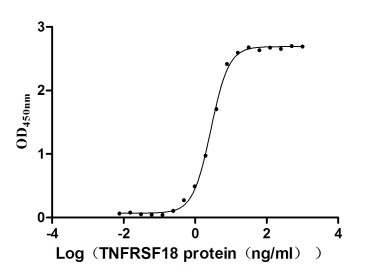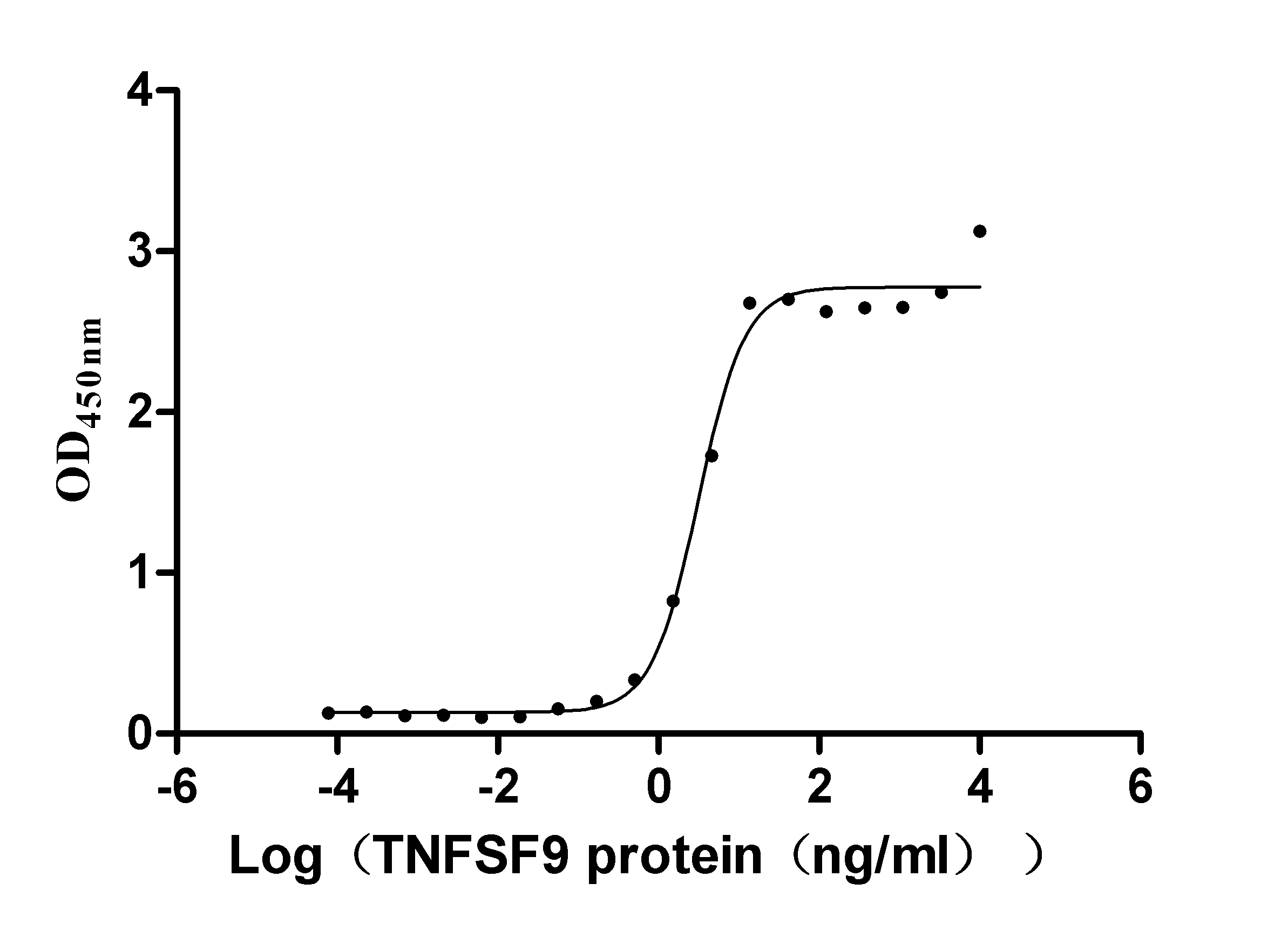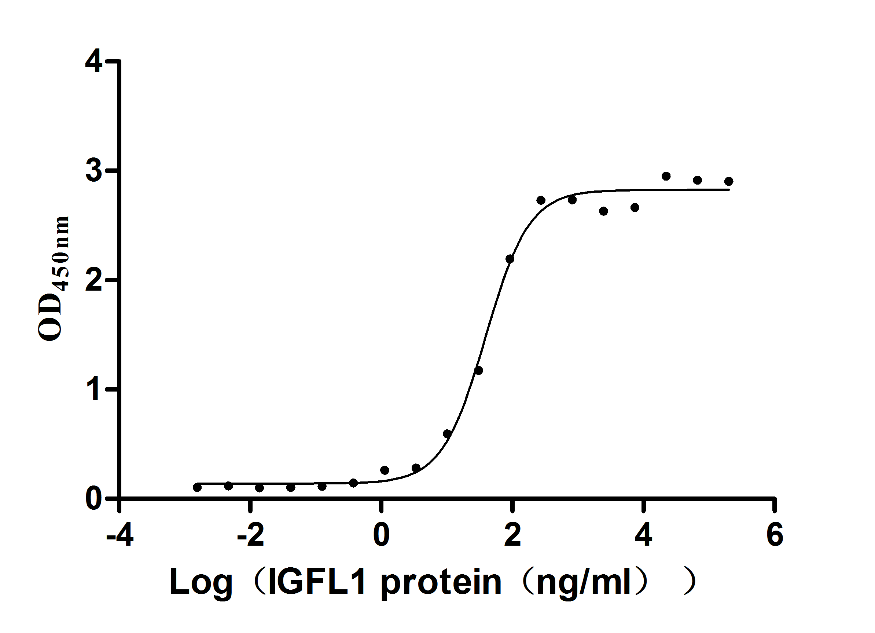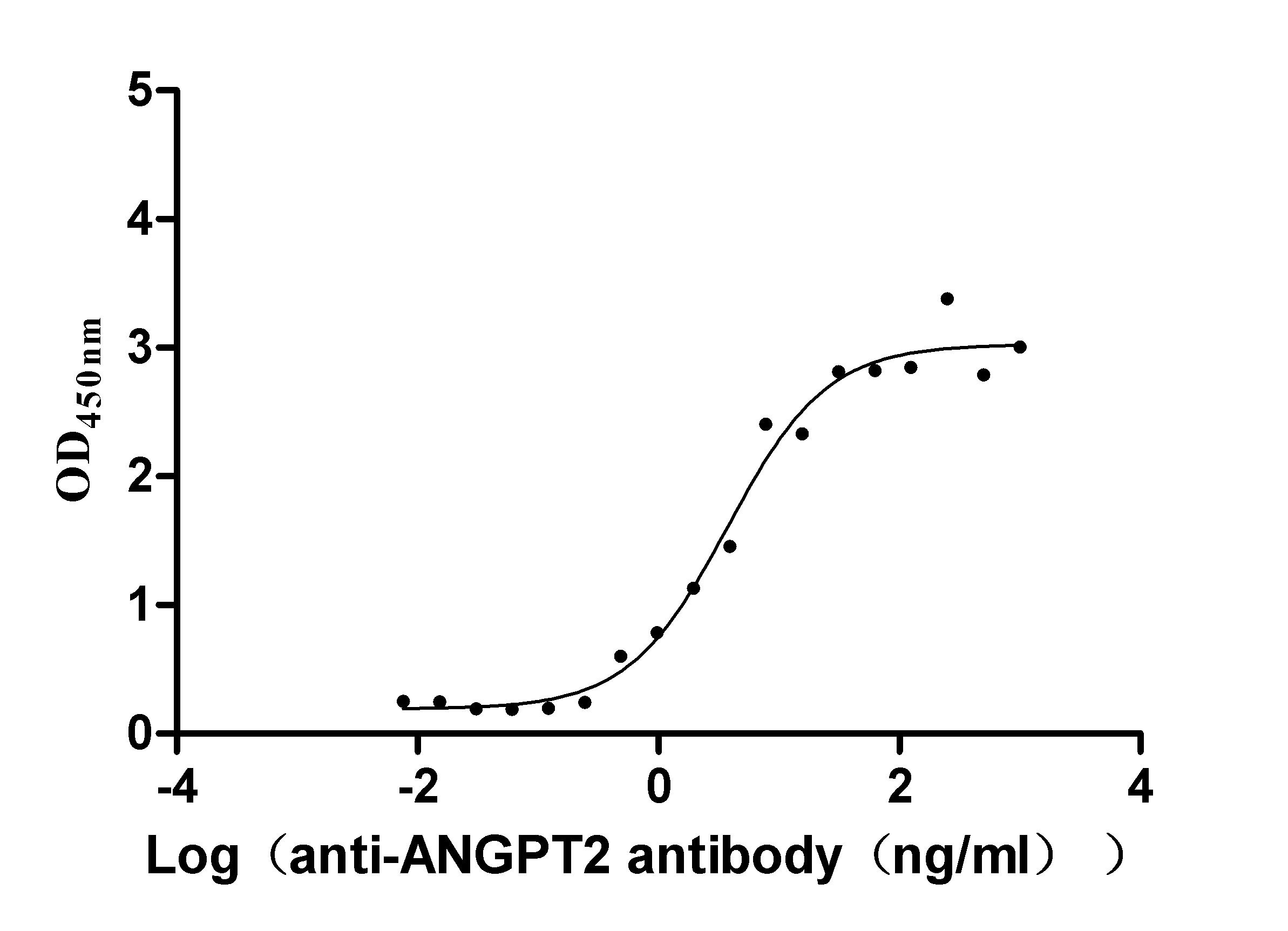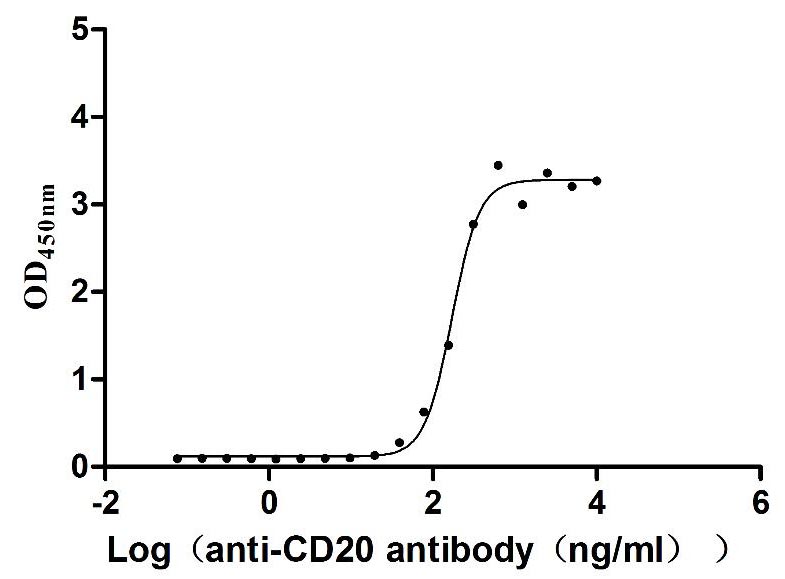Recombinant Mouse Cyclin-dependent kinase 4 (Cdk4)
-
货号:CSB-YP005065MO
-
规格:
-
来源:Yeast
-
其他:
-
货号:CSB-EP005065MO
-
规格:
-
来源:E.coli
-
其他:
-
货号:CSB-EP005065MO-B
-
规格:
-
来源:E.coli
-
共轭:Avi-tag Biotinylated
E. coli biotin ligase (BirA) is highly specific in covalently attaching biotin to the 15 amino acid AviTag peptide. This recombinant protein was biotinylated in vivo by AviTag-BirA technology, which method is BriA catalyzes amide linkage between the biotin and the specific lysine of the AviTag.
-
其他:
-
货号:CSB-BP005065MO
-
规格:
-
来源:Baculovirus
-
其他:
-
货号:CSB-MP005065MO
-
规格:
-
来源:Mammalian cell
-
其他:
产品详情
-
纯度:>85% (SDS-PAGE)
-
基因名:
-
Uniprot No.:
-
别名:Cdk4; Crk3Cyclin-dependent kinase 4; EC 2.7.11.22; CRK3; Cell division protein kinase 4; PSK-J3
-
种属:Mus musculus (Mouse)
-
蛋白长度:Full Length of Mature Protein
-
表达区域:2-303
-
氨基酸序列AATRYEPVA EIGVGAYGTV YKARDPHSGH FVALKSVRVP NGGAAGGGLP VSTVREVALL RRLEAFEHPN VVRLMDVCAT SRTDRDIKVT LVFEHIDQDL RTYLDKAPPP GLPVETIKDL MRQFLSGLDF LHANCIVHRD LKPENILVTS NGTVKLADFG LARIYSYQMA LTPVVVTLWY RAPEVLLQST YATPVDMWSV GCIFAEMFRR KPLFCGNSEA DQLGKIFDLI GLPPEDDWPR EVSLPRGAFA PRGPRPVQSV VPEMEESGAQ LLLEMLTFNP HKRISAFRAL QHSYLHKEES DAE
-
蛋白标签:Tag type will be determined during the manufacturing process.
The tag type will be determined during production process. If you have specified tag type, please tell us and we will develop the specified tag preferentially. -
产品提供形式:Lyophilized powder
Note: We will preferentially ship the format that we have in stock, however, if you have any special requirement for the format, please remark your requirement when placing the order, we will prepare according to your demand. -
复溶:We recommend that this vial be briefly centrifuged prior to opening to bring the contents to the bottom. Please reconstitute protein in deionized sterile water to a concentration of 0.1-1.0 mg/mL.We recommend to add 5-50% of glycerol (final concentration) and aliquot for long-term storage at -20℃/-80℃. Our default final concentration of glycerol is 50%. Customers could use it as reference.
-
储存条件:Store at -20°C/-80°C upon receipt, aliquoting is necessary for mutiple use. Avoid repeated freeze-thaw cycles.
-
保质期:The shelf life is related to many factors, storage state, buffer ingredients, storage temperature and the stability of the protein itself.
Generally, the shelf life of liquid form is 6 months at -20°C/-80°C. The shelf life of lyophilized form is 12 months at -20°C/-80°C. -
货期:Delivery time may differ from different purchasing way or location, please kindly consult your local distributors for specific delivery time.Note: All of our proteins are default shipped with normal blue ice packs, if you request to ship with dry ice, please communicate with us in advance and extra fees will be charged.
-
注意事项:Repeated freezing and thawing is not recommended. Store working aliquots at 4°C for up to one week.
-
Datasheet :Please contact us to get it.
靶点详情
-
功能:Ser/Thr-kinase component of cyclin D-CDK4 (DC) complexes that phosphorylate and inhibit members of the retinoblastoma (RB) protein family including RB1 and regulate the cell-cycle during G(1)/S transition. Phosphorylation of RB1 allows dissociation of the transcription factor E2F from the RB/E2F complexes and the subsequent transcription of E2F target genes which are responsible for the progression through the G(1) phase. Hypophosphorylates RB1 in early G(1) phase. Cyclin D-CDK4 complexes are major integrators of various mitogenenic and antimitogenic signals. Also phosphorylates SMAD3 in a cell-cycle-dependent manner and represses its transcriptional activity. Component of the ternary complex, cyclin D/CDK4/CDKN1B, required for nuclear translocation and activity of the cyclin D-CDK4 complex.
-
基因功能参考文献:
- CDK4/CDK6-dependent activation of DUB3 regulates cancer metastasis through SNAIL1. PMID: 28067227
- Study examined proliferation rates of cortical progenitor cells in mice lacking individual cdk proteins or combinations thereof. Results provide evidence that concomitant loss of cdk4 and cdk6 leads to reduced proliferation rates specifically in basal progenitor cells in both the dorsal and ventral forebrain. Cdk4-/-;Cdk6-/- double mutant progenitor cells in the dorsal telencephalon exhibit accelerated cell cycle exit. PMID: 29570951
- These results indicate that p18 blocks reprogramming by targeting Cdk4/6-mediated cell cycle regulation. PMID: 27484146
- Activation of cdk4 triggers NAFLD. PMID: 27373160
- This novel mechanism explains how CDK4 promotes anabolism by blocking catabolic processes (FAO) that are activated by AMPK. PMID: 29053957
- PD 0332991 (PD), an FDA-approved selective inhibitor of cyclin-dependent kinase 4/6 (CDK4/6), prevents radiation-induced lethal intestinal injury in mice. Treating mice with PD or a structurally distinct CDK4/6 inhibitor prior to radiation blocked proliferation and crypt apoptosis and improved crypt regeneration. PMID: 27701148
- Cdk4 protein PMID: 26975029
- The results demonstrate a unique CDK4-mediated mitochondrial communication that allows cells to sense environmental genotoxic stress and boost mitochondrial homeostasis by enhancing phosphorylation and activation of MnSOD. PMID: 25578653
- a crucial role of RXRa in suppression of UVB-induced melanomas in the context of driver mutations such as activated CDK4(R24C/R24C) or oncogenic NRAS(Q61K) and altered expression of p53 and PTEN PMID: 25189354
- Cdk4 and Cdk6 cooperate in hematopoietic tumor development and suggest a role for Cdk6 in sequestering INK4 proteins away from Cdk4. PMID: 25157181
- CDK4 seems to be expressed as multiple proteins that respond differently to different shRNAs, and have previously unrecognized functions at the S-G 2/M phases of the cell cycle via mechanisms independent of binding to CCND and RB. PMID: 24091631
- CDK4 deficiency markedly accelerated lymphoma development in the Emu-Myc transgenic model of B lymphoma PMID: 24614102
- Cdk4- and Arf-mutant mice exhibited similar profiles, the Trp53(F/F) ::Tyr-Cre(ER)::Tyr-NRAS melanomas were strikingly different, showing relative down-regulation of melanocyte-related genes, and up-regulation of genes related to neural differentiation. PMID: 23724991
- CDK4 amplification is associated with drug sensitivity in glioblastoma. PMID: 22711607
- CDK4-mediated regulation of cell functions via c-Jun phosphorylation and AP-1 activation PMID: 21559334
- Cdk4 has a direct role in angiogenesis in vivo and may be an important drug target to reduce or prevent angiogenesis during intestinal tumor formation. PMID: 20603602
- Cdk4 and its downstream transcription factor E2f1 regulate pancreas development prior to and during the secondary transition. PMID: 21490060
- Data show that Cdk4 plays a previously unrecognized role in thymocyte maturation and adhesion, but is not required for thymocyte proliferation. PMID: 21150327
- Results demonstrate that primary and metastatic melanomas developing spontaneously in Hgf-Cdk4(R24C) mice effectively evade cellular immune surveillance. PMID: 20649939
- Data show that in the absence of keratinocytic RXRalpha, in combination with mutant Cdk4, cutaneous melanoma was generated that metastasized to lymph nodes in a bigenic mouse model. PMID: 20629968
- Cdk4-R24C mutation contributes to the development of melanoma in Tyr-HRas mice. PMID: 20703083
- Overexpression of Cdk4 is associated with non-small cell lung carcinoma. PMID: 20609353
- analysis of a subset of glioblastoma multiforme likely to respond to CDK4/6 inhibition PMID: 20534551
- conclude that Cdk4 not only promotes beta-cell replication, but also facilitates the activation of beta-cell progenitors in the ductal epithelium. In addition, we show that Cdk4 controls beta-cell mass by recruiting quiescent cells to enter the cell cycle PMID: 20084282
- CDK4/6 inhibition is a potent mediator of cytostasis and that RB loss can be readily compensated for in the context of both hepatoma cell lines and liver tissue. PMID: 20100483
- cyclin-dependent kinase 4 and 6 inhibition arrests the growth of glioblastoma multiforme intracranial xenografts PMID: 20354191
- C/EBPalpha enhances the formation of cdk4-ubiquitin conjugates and induces degradation of cdk4 through a proteasome-dependent pathway. As a result, the half-life of cdk4 is shorter and protein levels of cdk4 are reduced in cells expressing C/EBPalpha. PMID: 11867521
- Explant-induced reactivation of herpes simplex virus occurs in neurons expressing nuclear cdk4 PMID: 12097586
- cyclin D-cdk4 activity modulates the subnuclear localization and interaction of MEF2 with coactivator GRIP-1 during skeletal muscle differentiation PMID: 12130539
- Cdk4 deficiency resulted in a 98% reduction in the number of skin tumors but did not affect normal keratinocyte proliferation PMID: 12163365
- Cdk4 is essential for immortalization, and suppression of Cdk4 could be a prospective strategy to recruit cells with inactive Arf/p53 pathway to senescence. PMID: 12435633
- calcineurin/NFAT pathway negatively regulates the expression of cyclin-dependent kinase 4 (CDK4) PMID: 12453415
- Inhibition of this activity enhances translation of p27kip1 in quiescent Rb-negative cells. PMID: 12566456
- several important differences between cdk4 and cdk6 that highlight unique functional roles for these cyclin-dependent kinases PMID: 12861051
- Cdk4 is not only involved in controlling proliferation of specific cell types but may play a wider role in establishing homeostatic cell numbers PMID: 12917627
- oocytes regulators amounts and localization undergo dramatic changes as the oocytes grow, meiotically mature, and transit into embryogenesis and CDK4, CDK6, cyclin D2, and p27 appear in unusual, most likely posttranslationally modified, forms PMID: 13679319
- P27Kip1 and p21Cip1 are not required for the formation of active D cyclin-cdk4 complexes PMID: 14517297
- deregulated cyclin D:cdk4/6 complexes and pRB perform nonoverlapping functions in vivo and provide a cellular mechanism that accounts for the low incidence of RB inactivation in cancers such as melanoma PMID: 14630948
- CDK4 has a role in mediate the transduction of different cell growth and proliferation signals with pINK4c PMID: 15254233
- Results show that cyclin-dependent kinase 4 (CDK4) mediates the proliferative and oncogenic activities of Myc in vivo through a mechanism that involves the sequestration of specific CDK inhibitors. PMID: 15314163
- Cdk4 and Cdk6 are not essential for cell cycle entry PMID: 15315761
- Cdk4 is dispensable for prenatal development of the pituitary or proliferation of other non-endocrine tissues but indispensable specifically for postnatal proliferation of somato/lactotrophs PMID: 15456744
- Cdk4, and its activator, cyclinD1, plays critical roles in the delayed death component of ischemic/hypoxic stress by regulating the tumor suppressor retinoblastoma protein. PMID: 16166266
- Cdk4 inhibition impairs adipocyte differentiation and function. Disruption of cdk4 or activating mutations in cdk4 in primary mouse embryonic fibroblasts results in reduced and increased adipogenic potential, respectively, of these cells PMID: 16213226
- There is a differential requirement for cyclin D1-CDK4/6 kinase activity in development versus tumorigenesis PMID: 16413468
- The continued presence of CDK4-associated kinase activity is required to maintain breast tumorigenesis. PMID: 16413469
- Mutation of BARA/LIN-9 restores the expression of E2F target genes in CDK4 null Mouse Embryo Fibroblasts, indicating that the wild-type protein plays a role in the expression of genes required for the G1/S transition. PMID: 16730350
- Mutant CDK4 dramatically increased the number and the growth kinetics of carcinogen-induced primary melanomas in the skin and promoted the growth of spontaneous metastases in lymph nodes and lungs. PMID: 16877364
- The Cdk4R24C mutation opens two avenues: when expressed specifically in beta cells, it provides a new potential strategy for beta cell regeneration in autoimmune diabetes, but its expression in the immune repertoire exacerbates autoimmunity. PMID: 18178859
- co-overexpression of KIT/CDK4 is a potential mechanism of oncogenic transformation in some BRAF/NRAS wild-type melanomas PMID: 18632627
显示更多
收起更多
-
亚细胞定位:Cytoplasm. Nucleus. Nucleus membrane.
-
蛋白家族:Protein kinase superfamily, CMGC Ser/Thr protein kinase family, CDC2/CDKX subfamily
-
数据库链接:
KEGG: mmu:12567
STRING: 10090.ENSMUSP00000006911
UniGene: Mm.6839
Most popular with customers
-
Recombinant Severe acute respiratory syndrome coronavirus 2 Spike glycoprotein (S), partial (Active)
Express system: Mammalian cell
Species: Severe acute respiratory syndrome coronavirus 2 (2019-nCoV) (SARS-CoV-2)
-
Recombinant Human B- and T-lymphocyte attenuator (BTLA), partial (Active)
Express system: Mammalian cell
Species: Homo sapiens (Human)
-
Recombinant Human SARS coronavirus Spike glycoprotein (S), partial (Active)
Express system: Mammalian cell
Species: Human SARS coronavirus (SARS-CoV) (Severe acute respiratory syndrome coronavirus)
-
Recombinant Human Tumor necrosis factor receptor superfamily member 18 (TNFRSF18), partial (Active)
Express system: Mammalian cell
Species: Homo sapiens (Human)
-
Recombinant Human Tumor necrosis factor ligand superfamily member 9 (TNFSF9), partial (Active)
Express system: Mammalian cell
Species: Homo sapiens (Human)
-
Recombinant Human IGF-like family receptor 1 (IGFLR1), partial (Active)
Express system: Mammalian cell
Species: Homo sapiens (Human)
-
Recombinant Dog Angiopoietin-2 (ANGPT2) (Active)
Express system: Mammalian cell
Species: Canis lupus familiaris (Dog) (Canis familiaris)
-
Recombinant Dog B-lymphocyte antigen CD20 (MS4A1)-VLPs (Active)
Express system: Mammalian cell
Species: Canis lupus familiaris (Dog) (Canis familiaris)


